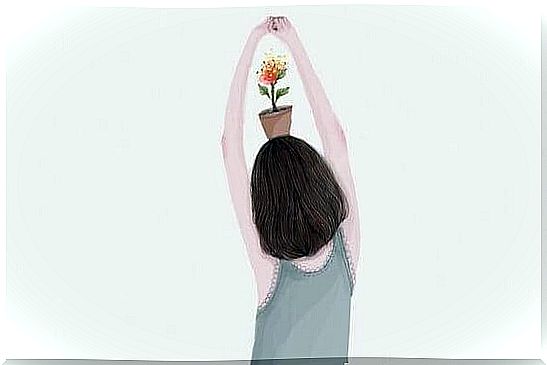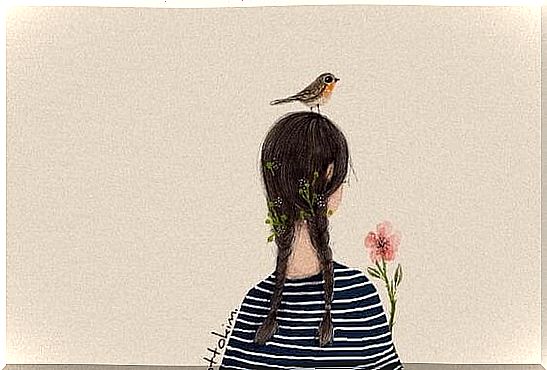The Healthy And Selfless Art Of Prioritizing Yourself

Prioritizing yourself is a healthy, useful, and necessary practice. Putting this skill into practice is not an act of selfishness, because loving this person who is reflected in our mirror without excuses, conditions or delays is taking care of yourself: investing in personal well-being and quality of life. Furthermore, those who take care of themselves as they deserve can also offer their best to others.
For example, it is curious to know that Socrates himself centered part of his teachings on the concept of self-care or what was defined at that time as “ epimeleia heautou ”. Later, Michel Foucault would return to this idea, to go deeper into it and conclude the following: only when a person can truly know himself, taking care of himself and offering himself value, can he achieve true freedom.
The truth is, we don’t know at what point and why most people began to hear that putting this type of strategy into practice was a selfish and selfish act. They confused terms, to the point of making us believe that altruism and respect for others do not harmonize at all with self-care or with the possibility of prioritizing ourselves as we deserve. Something totally fake.
Thus, and almost without realizing it, we were building relationships where this devout sacrifice lives, which makes us think that the more we offer to others, the more they will love us, the more they will value us. Bonds where what we do, in fact, is to abandon self-love in a ditch to its own luck, without looking back, thinking that we did what was right, what everyone expects of us.
Let’s avoid this harmful practice that triggers many of our problems, frustrations, anxieties, sleepless nights and even physical pain…

Those who fail to prioritize themselves suffocate
When a person fails to prioritize themselves to fill their schedule, their mind and their desires with phrases such as “I have to do this or that”, “I expect the best from me” or “I have to do this for this person”, the the only thing she can do is feel drained. It is empty of energy, identity, desires and, above all, self-esteem. The most complex part of all of this is that we sometimes put these habits into practice without thinking, without thinking for a moment about whether we really want to do that favor, that act, or that action.
Psychologists explain to us that we fall into the “do, do, do” automatism , rationalizing these actions as something natural and necessary. Because if we are useful to others, we will be valuable and because if we are needed by our loved ones, then we will be loved. However, this rule of three does not always give the expected result; in fact, it rarely happens.
What happens in these cases is something equally devastating and sad. Realizing that our continuous efforts and sacrifices are not valued, we develop a very critical view of ourselves, we blame ourselves for being so naive, so devout, for having trusted so much.
Sometimes this inner voice can be very cruel and, when this occurs, it does not take long for somatization to appear, translated as that muscle pain, that fatigue that tortures us, those digestive problems, those infections, those headaches and even that fall hair worrying…
Learn to “help yourself”
There are many people like that, embedded in the itineraries of others, like locomotives crossing the tracks of other territories, of other worlds alien to their own. They carry loads that aren’t theirs as their own and don’t have a day’s vacation; a day to be themselves and take care of themselves, to serve their own desires exclusively. Maintaining this situation for too long puts our balance and our mental health in jeopardy, which is why we recommend changing our focus on this inertia.

How to Learn to Prioritize Yourself in Four Steps
- Time. People who failed to prioritize themselves automated the word “yes”. In the face of any request, the magic word is enunciated as an impulse impossible to control. You have to put a brake on this momentum; for this reason, when someone asks us, suggests or orders us to do something, the recommended thing is, above all, to keep silent. So let’s avoid giving an immediate response to reflect for a few minutes and honestly assess whether or not we want to do what they’re asking. Let’s learn to say “NO”.
- Perspective. In order to learn to care for and serve ourselves, it is necessary to manage the distance (increasing or reducing) from everything that involves us. There comes a time when a person automates the need to “do, do, do” so much that he loses perspective. In this sense, saying “I don’t want to, I can’t, today I’m going to prioritize myself” is not the end of the world.
- Auxiliary phrases. It never hurts to have a small collection of phrases that can help us at certain times to protect our own needs, identity or personal time. “I’m sorry, but now is not a good time for me to do what you’re asking me to do”, “I appreciate you thinking of me for this, but I’ll take some time to myself”, “I’m not in the mood right now to do what you are asking me to do, I need to be alone”.
- Stop certain conversations. We all know how conversations that end with a request begin. These flourishes in which the pleasure culminates in the request that we are often sure we are going to fulfill. Since we are already more than trained in these strategies, let’s get rid of them as soon as possible. Let’s avoid burning out and practice assertiveness.
In conclusion, these four steps are not learned overnight. If we are willing and make a firm decision to take more care of ourselves and understand that prioritizing ourselves is an altruistic, necessary and essential act, day after day we will be more effective in these strategies: maintaining care for the other, but also for us .









